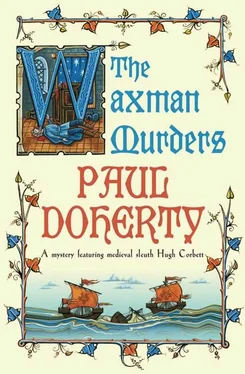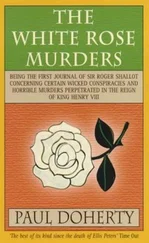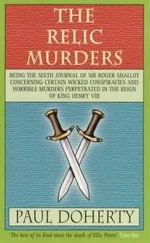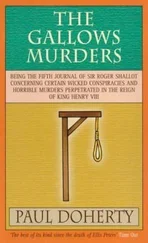Paul Doherty - The Waxman Murders
Здесь есть возможность читать онлайн «Paul Doherty - The Waxman Murders» весь текст электронной книги совершенно бесплатно (целиком полную версию без сокращений). В некоторых случаях можно слушать аудио, скачать через торрент в формате fb2 и присутствует краткое содержание. Год выпуска: 0101, Жанр: Исторический детектив, на английском языке. Описание произведения, (предисловие) а так же отзывы посетителей доступны на портале библиотеки ЛибКат.
- Название:The Waxman Murders
- Автор:
- Жанр:
- Год:0101
- ISBN:нет данных
- Рейтинг книги:3 / 5. Голосов: 1
-
Избранное:Добавить в избранное
- Отзывы:
-
Ваша оценка:
- 60
- 1
- 2
- 3
- 4
- 5
The Waxman Murders: краткое содержание, описание и аннотация
Предлагаем к чтению аннотацию, описание, краткое содержание или предисловие (зависит от того, что написал сам автор книги «The Waxman Murders»). Если вы не нашли необходимую информацию о книге — напишите в комментариях, мы постараемся отыскать её.
The Waxman Murders — читать онлайн бесплатно полную книгу (весь текст) целиком
Ниже представлен текст книги, разбитый по страницам. Система сохранения места последней прочитанной страницы, позволяет с удобством читать онлайн бесплатно книгу «The Waxman Murders», без необходимости каждый раз заново искать на чём Вы остановились. Поставьте закладку, и сможете в любой момент перейти на страницу, на которой закончили чтение.
Интервал:
Закладка:
Canterbury, December 1303
The three horsemen made their way along the old Roman road to Harbledown Hill. They’d sheltered at the priest’s house of St Nicholas’s church, using the royal seal to gain warmth and some food before continuing their journey. Now they were approaching the summit of the hill overlooking Canterbury and its splendid cathedral. Snow had fallen. The leaden grey skies threatened more. As they passed the crossroads with their empty gibbets and stocks, the lead rider reined in. Sir Hugh Corbett, Keeper of the Secret Seal of Edward I of England, soothed his skittish horse and pushed back the cowl of his cloak to reveal a long, olive-skinned face. Some men called it hawkish, with its deep-set dark eyes, sharp nose above full lips and firm chin: a watcher and a brooder, or so they said, like a falcon upon its perch, an aspect enhanced by Corbett’s raven-black hair, tinged with grey, swept back and tied tightly in a queue on the nape of his neck. Corbett was tall and slender, careful and fastidious about what he ate and drank. He usually made a joke about this, saying that he would like to regard himself as ascetic; in truth, his stomach was delicate after long and arduous campaigns in Wales and Scotland, where, with the rest of Edward’s troops, he’d drunk brackish water, eaten rotten meat and cut his teeth on iron-hard rye bread. He was dressed in dark red and black, his leather jacket clasped close over a white linen shirt, his dark blue cloak pulled tight over red leggings and high-heeled boots, the best from Cordova, on which silver-gilt spurs jingled. He took off the long leather gauntlet on his left hand and the chancery ring, the symbol of his office, gleamed in the day’s dying light. Then he loosened the broad leather war belt round his waist from which sword and dagger hung.
‘Now,’ he leaned forward, gripping the high saddle-horn, ‘when we reach the top of this hill we’ll see Canterbury, and its cathedral, which holds the shrine of the blessed Becket. We’ll then sing a pilgrim hymn, or perhaps something more liturgical, appropriate to the season.’ Corbett had been looking forward to this. He liked nothing better than the plainchant of the Church, the rise and fall of the music emphasising the awesome words and the rolling Latin phrases which conveyed a deep sense of the spiritual, of man’s place before God. His companions were not so enthusiastic.
‘Master, must we?’ Ranulf atte Newgate, red-haired and green-eyed, his thin white face made even more so by the intense cold, pushed back his own hood and glared at Corbett. ‘We’ve been travelling,’ he moaned, ‘since Lauds.’
Ranulf, Senior Clerk in the Chancery of the Green Wax, simply wanted to ease himself out of the saddle, take off his boots and, as he’d remarked to the third member of their party, the mop-haired, moon-faced Chanson, Clerk of the Royal Stables, toast himself in front of a roaring fire. Now he undid the top clasp of his black leather jerkin and pointed across at Chanson.
‘Despite his name, he cannot sing. He sounds more like a fiend sitting on a scorching skillet getting his arse burnt.’
‘At least I’m not terrified of the countryside,’ Chanson retorted. ‘He is, you know, master. He believes all sorts of gargoyles lurk in the undergrowth.’ Chanson nursed the inside of his right leg. ‘I’ve a sore here,’ he groaned. ‘I need a physician more than I do a hymn.’
‘We’ll sing first,’ Corbett insisted. ‘Chanson, you may do so softly. It’s all part of the pilgrim tradition, to give thanks when you glimpse Canterbury.’ He put on his gauntlet and pulled up his hood.
Ranulf quietly cursed and Chanson whispered insults as they made their way up Harbledown Hill. The snow began to fall again, faintly at first, then the flakes became like great white feathers floating down. When they reached the summit, they glimpsed, through the gathering murk, the King’s city of Canterbury with its crenellated walls, squat castle, brooding Westgate, lofty church towers, and soaring above all this, the minster of the cathedral, its mass of carefully carved masonry rising like a prayer against the evening sky. The lights of the city glowed like candles about it; the smoke from fires and workshops hung like gusts of incense around this holiest of England’s shrines.
For a while, despite the gathering gloom, Corbett tried to point out the principal landmarks, then he dismounted, only to turn abruptly at a sound behind him. Another group was approaching; its leader carried a huge lantern with an enormous fiery candle glowing inside. The strangers passed Corbett’s party, pushing their way by. The light-bearer thrust the lantern pole into a deep snowdrift beside the trackway, sending the shadows dancing. The strangers grouped together oblivious of the chaos they had caused. Ranulf’s horse whinnied and reared, whilst the pack pony Chanson was leading abruptly moved back on its hind legs. Ranulf, exasperated, drew his sword; the icy scraping sound stilled the chatter amongst the strangers. They looked round, and their leader shuffled back through the snow. He was cloaked and hooded, the lower part of his face hidden beneath broad cloth bands. In the poor light his eyes glittered; when he pulled the mouth bands down, his hot breath burst clear on the wintry air.
‘ Gaudium et spes .’ He growled the usual Christmas greeting. ‘Joy and hope.’
‘ Gaudium et spes ,’ Corbett replied, indicating that Ranulf should re-sheathe his sword.
‘We are Les Hommes Joyeuses — the Joyous Men,’ the fellow continued, ‘travelling players. Our carts are somewhere behind us. We have come to give thanks to our patron Thomas a Becket and to God’s Holy Mother.’
‘Then, friend,’ Corbett hid his smile, ‘we shall sing together. But why are you travelling to Canterbury in the dead of winter?’
‘In thanksgiving,’ the leader of the Joyeuses replied, continuing the pretence that he did not know Corbett. ‘To sing a carol to Christ’s Blessed Mother. Last month we sheltered in Suffolk.’ The man, one of Corbett’s spies, chattered on. Corbett waited for the real message. ‘Ah yes, we are glad to be out of Suffolk, with its treasure-hunters, lepers and grisly death. We bring all sorts of news. Ah well,’ he stamped his feet, ‘are we to stay here and freeze?’
In the flickering light of the candle, Les Hommes Joyeuses assumed a funereal air lacking any kind of Yuletide cheer.
‘By what name are you called?’ the leader asked. He wanted Corbett to reassure the rest of his party.
‘Sir Hugh Corbett, king’s emissary to Canterbury, Keeper of the Secret Seal.’
The Joyeuses came forward, their dismal air lifted; hands appeared from beneath cloaks. Corbett heard the scrape of blades being shoved back into sheaths, as cowls and hoods were pushed back.
‘I am sorry,’ their leader confessed, winking quickly at Corbett, ‘we thought you were different, something else, perhaps outlaws or wolfsheads.’ He extended a hand. ‘Robert Ormesby, formerly clerk of Taunton, Somerset, now the Gleeman, poet, mummer and mimer.’
Corbett grinned, grasped the Gleeman’s hand and squeezed it gently. ‘Then let us carol merrily together! What chant?’
‘Advent is drawing to a close,’ the Gleeman replied, pursing his lips. ‘Why not one of the O antiphons? “Clavis David” or “Radix Jesse”?’
Corbett, much to Ranulf’s annoyance, agreed heartily to both and they all trudged to the far side of Harbledown Hill, the snow falling thick and fast. Ranulf was reluctantly coaxed to join in. Tunes were hummed; Corbett conceded the honour of cantor to the Gleeman, whose strong voice broke into the beautiful antiphon: ‘Root of Jesse, set up as a sign, come to save us. .’
Читать дальшеИнтервал:
Закладка:
Похожие книги на «The Waxman Murders»
Представляем Вашему вниманию похожие книги на «The Waxman Murders» списком для выбора. Мы отобрали схожую по названию и смыслу литературу в надежде предоставить читателям больше вариантов отыскать новые, интересные, ещё непрочитанные произведения.
Обсуждение, отзывы о книге «The Waxman Murders» и просто собственные мнения читателей. Оставьте ваши комментарии, напишите, что Вы думаете о произведении, его смысле или главных героях. Укажите что конкретно понравилось, а что нет, и почему Вы так считаете.












